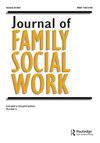衡量神经残疾儿童养育计划中的家庭结果:一项范围界定综述
IF 0.7
Q3 SOCIAL WORK
引用次数: 1
摘要
背景:针对神经障碍儿童家庭的育儿计划被推荐为标准护理,因为它们通常针对与儿童和父母健康相关的儿童行为问题。尽管家庭环境是通过育儿项目学习到的技能得以实施的背景,但研究结果通常集中在孩子和父母的因素上,而没有持续地研究家庭单位。目的确定如何在有神经障碍和共病行为问题的儿童家庭的育儿计划的背景下衡量家庭水平的结果。方法采用范围审查方法来识别和综合与神经障碍儿童家庭育儿计划相关的证据,包括一些家庭幸福的测量。结果:本综述包括29项涉及家庭幸福感测量的育儿项目研究。结果强调了家庭层面结果和家庭特征概念化的多样性。一般家庭功能是最常见的测量结构,尽管也确定了一些特定残疾的家庭测量。结论:未来对育儿计划的研究应包括孩子和父母幸福之外的家庭层面的结果。鼓励研究人员根据有助于解释被测量的家庭相关结构的潜在理论框架将结果置于背景中。本文章由计算机程序翻译,如有差异,请以英文原文为准。
Measuring family outcomes in parenting programs for children with neurodisabilities: a scoping review
ABSTRACT Background Parenting programs for families of children with neurodisabilities are recommended as standard care because they often target child behavior problems that are tied to both child and parent well-being. Despite the family environment being the context in which skills learned through parenting programs are implemented, study outcomes typically focus on child and parent factors without consistently examining the family unit. Aims To identify how family-level outcomes are measured in the context of parenting programs for families of children living with neurodisabilities and comorbid behavior problems. Methods Scoping review methodology was used to identify and synthesize evidence related to parenting programs for families of children living with neurodisabilities that included some measurement of family well-being. Results Included in this review were 29 studies of parenting programs that involved some measure of family well-being. The results highlight the diversity in which family-level outcomes and family characteristics are conceptualized. General family functioning was the most frequently measured construct, though several disability-specific family measures were also identified. Conclusions Future research on parenting programs should include family-level outcomes beyond child and parent well-being. Researchers are encouraged to contextualize results based on the underlying theoretical frameworks that help to explain the family-related construct being measured.
求助全文
通过发布文献求助,成功后即可免费获取论文全文。
去求助
来源期刊

Journal of Family Social Work
SOCIAL WORK-
CiteScore
2.10
自引率
0.00%
发文量
4
期刊介绍:
Each issue of the Journal of Family Social Work contains peer reviewed research articles, conceptual and practice articles, creative works, letters to the editor, and book reviews devoted to innovative family theory and practice subjects. In celebrating social workers" tradition of working with couples and families in their life context, the Journal of Family Social Work features articles which advance the capacity of practitioners to integrate research, theory building, and practice wisdom into their services to families. It is a journal of policy, clinical practice, and research directed to the needs of social workers working with couples and families.
 求助内容:
求助内容: 应助结果提醒方式:
应助结果提醒方式:


